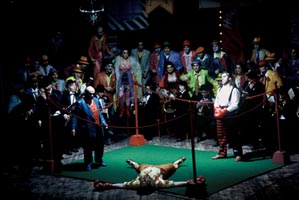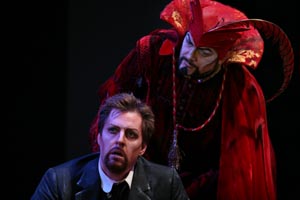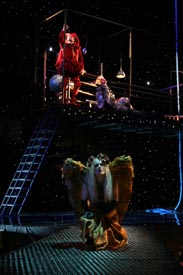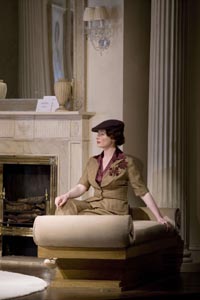
Loney's Show Notes
By Glenn Loney, June 4, 2007
About Glenn Loney
 |
| Caricature of Glenn Loney by Sam Norkin. |
Please click on " * " to skip
to each subject in this index:
Il Festival dei Due Mondi:
When Worlds Collide! *
Remembering Gian-Carlo Menotti— *
Spoleto/Charleston: Performing-Arts from Both Home & Abroad! *
L’ILE DE MERLIN, OU LE MONDE RENVERSÉ [****] *
AUFSTIEG UND FALL DER STADT MAHAGONNY [****] *
FAUSTUS, THE LAST NIGHT
[***] *
THE CONSTANT WIFE [****] *
INTERMEZZI & CONCERTI: *
Il Festival dei Due Mondi: When Worlds Collide!
Remembering Gian-Carlo Menotti—
The High Point of Charleston’s Spoleto Festival 2007 was the touching Tribute to Gian-Carlo Menotti, presented 31 May 2007. Menotti had passed away only four months before, dying on 1 February 2007.
Festival-visitors were reminded of the Founding of Menotti’s distinctive festival, way back in 1958, in Umbrian Spoleto. Menotti had always had the idea of a Festival dei Due Mondi in mind, but the American-venue took him a while to find.
Eloquent tributes were offered by Nigel Redden—who was Menotti’s aide & who succeeded him as fest-director in Charleston, by Joseph Flummerfelt, Laureate-Conductor of the Westminster Choir—long a musical-mainstay of the Festival, & by Charleston’s Mayor, The Hon. Joseph P. Riley, Jr.
Musical Tributes included the aria, To This We’ve Come, from The Consul, powerfully sung by Karen Huffstodt—also Widow Begbick, in the Festival’s Brecht/Weill Mahagonny.
Menotti’s Pavanne, from his Sebastian Suite, opened the tribute, which closed with the beloved Adagio for Strings, by his dear friend, the late Samuel Barber.
Despite all the Salutes to Menotti’s Genius as a composer/librettist—as well as a conductor/director—none of the three Eulogists could avoid noting Menotti’s Difficult-Side.
There was a Crucial Break in 1993. The Ageing Menotti—not wanting to lose artistic-control over the Charleston side of the Two Worlds Festival—insisted that his adopted-son Francis be installed in the post. This was not acceptable to those organizing & funding the fest on this side of the Atlantic.
The Breach between the Spoleto Festival in Italy & its Sister-fest in Charleston became final. It is still not healed… With the Maestro’s Passing, hopes have been expressed that the Two Worlds may again become One.
Incidental Intelligence: Your Correspondent—a great admirer of Gian-Carlo Menotti, not only as a Composer, but also as a Man of Theatre—once asked him for an Interview about his Creative-Process, for a proposed book, Opera-Theatre, or Concerts-in-Costume?
As Menotti was virtually the only Modern Composer whose Major Operas had premiered On Broadway, rather than in opera-houses, I hoped he would share with readers How He Did It…
He eagerly agreed, asking only that his then-assistant, a Musical Israeil, Mooky Dagan, could be at his side. But when we had settled ourselves at the Carlyle—and I took out my tape-recorder—Menotti recoiled in real horror.
He spoke clearly & distinctly: Put that Thing away! Right Now!
Because I never take notes—I cannot read my own handwriting—I was at a loss to continue. We exchanged some pleasantries about The Telephone & The Medium, Amelia Goes to the Ball, The Saint of Bleecker Street, The Old Maid & the Thief, Amahl & the Night Visitors, The Consul, & Maria Golovin—which I had seen in the American Pavilion, at the Brussels World’s Fair.
Many years later—it must have been that fateful 1993!—Gian-Carlo’s personal Press-Rep arranged an Interview, for which I was assured I could at last use a Tape-Recorder. Menotti wanted to make certain everything he said would be On Record.
I was told this was all being arranged privately, that I should wait for a call from New York, regarding when & where it would take place in Charleston. And that I should mention this to No One at the Festival…
But when I arrived at the Festival Press-Office, I was asked if I’d like to arrange any interviews with the various artists. Unwisely, I mentioned that I was supposed to interview Menotti…
That was my last Charleston Spoleto Festival—until last week. And I have never been back to beautiful hillside Umbrian Spoleto in Italy…
If invited, I will certainly return to Charleston. And I’d also love to return to Spoleto, Gubbio, Lake Trasemene, & Perugia!
Spoleto/Charleston: Performing-Arts from Both Home & Abroad! |
| Pictured: Philip Glass, poster-boy for Charleston's Spoleto Festival. Painting by Chuck Close. |
The huge, bulky program for the Spoleto Festival features the Chuck Close Pointillist Daub-Mosaic of Philip Glass on its cover. Very striking! In fact, Glass is this year’s Poster-Boy!
Even more striking are the two immense reproductions of the Close/Glass-Face on the Gaillard Auditorium. These serve to alert Festival-goers that the American Premiere of Glass’ Book of Longing is on the program.
This staged-event is based on the Images & Poetry of Canadian Poet Leonard Cohen. Unfortunately it was being presented only after the North American Music-Critics had departed Spoleto.
Considering the number of Co-Producers listed in the program, Book of Longing will open its pages at a stage near you sometime in the next few seasons. And why not? Some seasons ago, Calgary’s One Yellow Rabbit assembled a charming Cohen-based performance that also toured—even to the Edinburgh Festival…
Your correspondent also missed seeing Charlie Chaplin’s daughter, Victoria Thierrée Chaplin, again. Daughter of Oona O’Neill Chaplin, she & her husband—Jean-Baptiste Thierrée—created a new kind of circus way back in 1970: Le Cirque Bonjour, followed by the world-touring Le Cirque Imaginaire.
Her new work, Aurélia’s Oratorio, is actually performed by her daughter, Aurélia Thierrée, with Julio Monge. But it was only one of a number of Inviting Attractions: One had to pick & choose…
Not least because the North American Music Critics had only a brief Window-of-Opportunity. We also missed Swan Lake, performed by Nina Ananiashvili & the State Ballet of Georgia!
Also missed: Rubberdance, Major Bang, Shen Wei, medEia, Batsheva, & blessing the boats.
Music Critics were invited by Festival Director Nigel Redden to inspect the on-going renovation of the neglected Deco-Classic Memminger Auditorium to create a handsome new Black-Box festival-venue.
This is a somewhat weather-damaged gem from the Age of the Great Depression, but Charleston/Spoleto’s most historic-venue—at least In Spirit— is the venerable Dock Street Theatre, whose history stretches back to 1736. Though not in the current playhouse…
Also in the Depression, the WPA created a new Dock Street Theatre in the shell of the historic Planter’s Hotel, which gave the World Planter’s Punch. The "revived" Dock Street—as it looks today—opened in 1937.
As with Edinburgh’s prestigious Fringe Festival, there’s also the Piccolo Spoleto, although it is not so ambitious. Opera Is For Everyone featured two Christmas-Operas: Humperdinck’s Hansel & Gretel & Amahl & the Night Visitors, by Spoleto’s Founder, Gian-Carlo Menotti.
Piccolo’s Spotlight Concerts programmed—among other chamber-groups—the St. Petersburg String Quartet—not from Florida, but from the former Leningrad!
There was also a Tell Me a Story Children’s-Festival, Sister-City Jazz: New Orleans & Charleston, plus the Finale: A Big Fat Middle-Eastern Wedding-Celebration!
I missed—from long, long ago—Circus Flora, with its baby-elephant that Martha Clark brought up to Brooklyn’s BAM for one of her less-successful Performance-Collages.
But there was, as usual, a Plethora of Charleston Museums & Gallery Exhibitions, plus & Art & Craft Shows. Nor is a visit to Charleston Harbor complete without a boat-ride out to Fort Sumter, flash-point of the War Between the States…
L’ILE DE MERLIN, OU LE MONDE RENVERSÉ [****] |
| L’ILE DE MERLIN at the Spoleto Festival. |
Merlin’s Island had its World Premiere in Vienna on 3 October 1758! Here, now, in Spoleto/Charleston, this charming opera buffa—composed by le Chevalier Christoph Willibald von Gluck—finally had its American Premiere.
Considering the classical-status of Gluck’s Orfeo—recently stunningly revived at the Metropolitan Opera—how did it take so long for this charming little Intermezzo to break through South Carolina’s metaphysical Barrier-Reef?
For that matter, how does it happen that such forgotten works are more often discovered at the Spoleto Festival, rather than in Manhattan, Chicago, or San Francisco?
Thanks to the Genius & Curiosity of the Festival’s Founder, Gian-Carlo Menotti, and those who have come after him, the Spoleto Festival—both in Italy & in America—has always been interested in the Old, as well as the New!
The reasons for the Epic Neglect of Gluck’s little Curtain-Raiser are not difficult to discover. First, as it is only about an hour or less in length, with what will you pair it?
Second, when you study the Libretto—not by le Chevalier, but Louis Anseaume—does this satiric attack on the Manners & Morés of Mid-18th Century Parisians have any Relevance or Interest today?
The slight story is based on a conceit of Jean Lafontaine—he of the Fables of Lafontaine Fame—who used this fiction to critique the Follies & Fashions of an especially Decadent Age. Not that Molière had not already done so in the Previous Century. Plus ça change, as they say…
This Musical-Fable is essentially Utopian—which lends it an odd, Timeless Appeal. Obviously, the Viennese must have loved being able to look down their noses at the always Snooty Parisians!
Gluck knew both Paris & Vienna very well: even well before Richard Wagner’s Paris Misadventures, you had to create different versions of your operas for these demanding audiences…
Gluck’s sub-title says it All: The World Turned Upside-Down! The buffa opens with Pierrot & Scapin—those popular Commedia rascals—landing on Merlin’s Island of Enchantments. They meet two lovely girls, Argentine & Diamantine—a Lucky-Strike, Silver & Diamonds!
Being Quintessential Parisian Lads, they want not only Beauty, but also Money, lots of it. As everything is turned upside-down on this Magic Island, the charming girls have too much money & are only too eager to share it with the Poor, especially with Poor Husbands.
But the boys have Rivals for their Hands & Hearts, and the issue of who gets whom must be settled by throws of the Dice. The odd thing about this Crisis is that they LOSE!
But their Loves & Longings are so strong that Merlin intervenes & joins them anyway. Happy Ending!
Also a Happy Ending for Spoleto Audiences, for stage-director Christopher Alden chose to Update the Fable, which still suggests that not much has changed in regard to Lawyers, Doctors, Playboys, Judges, Business-Men, & Starving-Artists!
 |
| L’ILE DE MERLIN, OU LE MONDE RENVERSÉ. |
Only on Merlin’s Utopian Island will you find Compassion, Honesty, Decency, Generosity, Thoughtfulness, & True & Undying Love! In Merlin’s Realm, Marriage is Forever!
Chris Alden—whose twin-brother David Alden is even more daring in Updating Period-Operas—could have chosen to set this charming conceit in Gluck’s Time—or in some sort of Baroque Fantasyland.
Instead, he had set-designer Andrew Lieberman create a big white-box of a room, open to the audience even before Pierrot & Scapin stumbled into it. At the center upstage was a cyanide-green sofa on which the lads variously lolled, as a sleek white podium scooted across the downstage to introduce the lovely ladies.
On the back-wall was a framed Plasma-screen with that Infamous View of Mountains, fronted by two Converging-Streams, endlessly flowing, surveyed by a Transfixed Deer. Merlin makes an appearance on the screen at the close…
An upstage-right Water-Cooler insert—from which the characters liberally drink—revolves to reveal the Philosopher, Monsieur Candor, the Playboy, & Hippocratine, a remarkable woman-doctor who believes in Letting Nature Heal what ails you!
Of course Gluck’s Score is what makes this work really worth reviving. And its varied challenges are well met by Eugene Brancoveanu, as Scapin; Keith Phares, as Pierrot; Monica Yunus, as Argentine; Amanda Squitieri, as Diamantine; Constance Hauman, as Hippocratine; Kevin Burdette as the Notary, and, last but not least, Richard Troxell in the remaining Six Roles!
Kaye Voyce’s costumes are Very Trendy & often amusing—especially having the Philosopher appear in a giant Happy Face roundel.
There are some Textual Longeurs, as Points Are Made about the differences between Parisian-Types and their Ideal Counterparts on Merlin’s Island. But the young actor/singers strive to make these at least amusing & contemporary.
The estimable Harry Bickett conducted—at home with both the Baroque & the Gluckian Opera-Reforms—and even more at ease with these works set in Modern Times. The bright young Spoleto Festival USA Orchestra instrumentalists—festival-sponsor Ginn Resorts is also part of its clunky-title—were effective.
AUFSTIEG UND FALL DER STADT MAHAGONNY [****] |
| Rise and Fall of the City of Mahagonny at the Spoleto Festival. |
On Broadway, fans of the Satirical-Musicals of Bertolt Brecht & Kurt Weill have had no recent opportunity to see as provocative a production of Mahagonny as has been on view down in the Carolinas. In fact—aside from a recent disastrous revival of The Threepenny Opera at Studio 54—Mahagonny hasn’t been seen for a while.
Since the Fall of the Berlin Wall back in 1989, Brecht hasn’t seemed so Trendy anymore either. But Mahagonny still has a lot of sting in its tail.
What New Yorkers do get, however, are several repetitions of Moon of Alabama—virtually the musical-parody’s Signature-Song—in Harold Prince’s new Weill/Lenya Biop, LoveMusik. This is being very well-received, but how much more powerful it would be to have the Lyric in its Proper Context!
The stunning new Spoleto/Charleston Rise & Fall of the City of Mahagonny is, in fact, a co-production with the Opéra de Lausanne. Before the bizarre & colorful sets & costumes get carted off to Lausanne, won’t there be some possibilities for this dynamic show to be seen in New York, as well as other major American Music Metropolises?
Karen Huffstodt is flamboyantly compelling as the Widow Leokadia Begbick, with her City of Nets, designed to ensnare Unwary & Women-Hungry Alaska Gold-miners such as Jimmy Mahoney & Alaska Wolf Joe [Richard Brunner & Kirk Eichelberger].
Begbick’s accomplices are the wily Trinity Moses [Tim Nolen] & the menacing Fatty [Beauregard Palmer]. Dennis Petersen plays both Jakob Schmidt & Toby Higgins, with John Fanning as Bill, the Old Alaska Friend who will not save Jimmy from the Noose. But who will walk off with the compliant Jenny…
Tammy Hensrud offers a conniving, clinging, sluttish portrait of Jenny Hill. [What was it with Kurt Weill & treacherous women named Jenny? Or was Jenny really Bert Brecht’s Obsession?]
Conductor Emmanuel Villaume holds all the production-elements together. They are considerable: not only the Principals, but also the Girls of Mahagonny & members of the Westminster Choir as Men of Mahagonny, all deftly staged by co-directors Patrice Caurier & Moshe Leiser.
There are also a number of Cartoonish set & prop elements—devised by Christian Fenouillat—that get scooted around an essentially bare-stage by cast & crew-members. These work very well in setting scenes & establishing moods, but there are also two corrugated-steel Brechtian Alienation-
Effect curtain-drops to separate scenes.
The director-duo often use these steel-screens to reveal the raffish Mahagonny characters frozen in line, in various characteristic-poses. These are very effective, not least because of the sexy, shiny, & brightly-colored leather-costumes of Agostina Calvaca. Also good lighting by Christophe Forey!
FAUSTUS, THE LAST NIGHT [***] |
| Faustus, The Last Night at the Spoleto Festival. |
From the Ur-Faust to Marlowe’s Dr. Faustus, & onward to Goethe’s Faust, Parts I & II, & beyond to Berlioz’s Damnation of Faust, the Medieval Fable of the Not-so-Wise Old Professor of Wittenberg—who sells his Soul to Mephisto to be Young Again & Know the Pure Love of an Innocent Maiden—continues to fascinate.
Before Berlioz’ 1846 Faust, there was Ludwig Spohr’s 1816 version, both followed by the best-known operatic-version, Charles Gounod’s 1859 Faust—which is known in Germany as Marguerite, because the Teutons think the French composer emasculated Goethe’s Epic Drama.
Not to overlook Arrigo Boito’s Mefistofele opera & Busoni’s Faust opera, unfinished at his death. Then there’s also Thomas Mann’s imposing Dr. Faustus, followed by son Klaus Mann’s Mephisto. This deals with his lover, the famed German actor/director Gustaf Gründgens, who was a notable Mephistopheles—onstage & off, managing to star for the Nazis & be de-Nazified to star again!
Pascal Dusapin’s new version—featuring Faust’s Last Night—was premiered in Berlin, 21 January 2006, at the Staatsoper Unter den Linden. Unlike Goethe’s Extended Vision, it is essentially a one-act opera, with both libretto & score by Dusapin—who has also composed five other operas!
Despite its Francophone Origins, Dusapin’s Faustus had to have a German Premiere? Possibly because Faust was a German Academic? Conducted by John Kennedy [no relation], the Spoleto Premiere, however, was sung in English.
David Herskovits was clearly a good choice for director of the American Premiere. He & his Mordant Crew at Target Margin have been dramatically-dissecting Corpus Faustus for the past two seasons Off-Broadway.
You may well ask: What Is Hell Like? But you will not find that out from watching Dusapin’s opera, although his score may offer a few Musical-Clues…
A very Long Way Off from the Elizabethan Moral World of Marlowe’s Faustus—or of Goethe’s Romantic Redemption—Dusapin’s Faust is trapped in Modern Dilemmas: Torn between Devil-Evil & Angelic-Scolding, he may well wonder what is Good/God? What is Evil?
On the Last Night of his Earthly-Life, will Faust repent? Or will he be Damned for All Eternity?
Or is Our World Now more Beckettian? Will the Long Night of the Soul blend into just another day, in which Faust—and we, as well—are still Waiting for God-ot?
 |
| Faustus, The Last Night at the Spoleto Festival. |
Herskovits’ ingenious designers—Carol Bailey, David Zinn, & Lenore Doxsee—drawing upon ideas for set-props & environments for Target Margin’s various Faustian-Experiments, opted to present Faust in an open-box-of-a-study, replete with Globe, Telescope, & other Arcana, raised above the stage-floor.
Stephen West was Mephistopheles to the fastidious Faustus of John Hancock. And Heather Buck was a Vigilant Angel, with Adam Klein & Daniel Mobbs as Sly & To-god.
Oddly enough—although my colleague was in the orchestra—my seat was in the last row of the Sottile Theatre’s balcony, so I could hardly see what was going-on onstage. But I could hear the Searing Sonorities & the Clanging Dissonances very well, as some of the orchestral-brass was right behind me.
As for the Philosophical Argument of Pascal Dusapin’s confrontation of Faust with both Devil & Angel, I’d really have to be closer next time to figure out what they are complaining about. I think Faust kept demanding to know if there were Skies beyond the Moon?
Was he trapped in Medieval Cosmology, unaware that there are Galaxies beyond Imagination, & even possibly Universes beyond Comprehension?
I did detect several quotes from Shakespeare, having to do with Music: "If music be the Food, &&&& These were intoned by the Sly character—who may be a reference to the opera, Sly—inspired by Shakespeare’s Inductive Sly in The Taming of the Shrew?
A studious look at Dusapin’s libretto might unravel this Mystery. There were, in fact, English sub-titles, in addition to the work being sung in English. But it is still a mystery to me: at the close, the Principals were all strewn about the stage. No one had been dragged down to Hell. Not Yet…
THE CONSTANT WIFE [****]Although W. Somerset Maugham—in his West End heyday—wrote a number of social comedies, with an often Wildean Wit, most of them have been unfortunately forgotten, leaving only a small Canon of Regional Repertory Theatre Standards, such as Our Betters, The Circle, & The Constant Wife.
 |
| The Constant Wife. Photo by Shane McCarthy, 2006. |
But few American companies are equal to the challenges Maugham sets in Manners, Style, & Scintillating Repartée. Recently, the Roundabout gave The Constant Wife a whirl, but—even with Lynne Redgrave in the cast—it was leaden, almost lifeless.
The Management should have waited several seasons instead & imported the splendid Dublin production, mounted by the Gate Theatre, now on view at the Dock Street Theatre during the Spoleto Festival.
No attempt has been made to Update this essentially Art Deco-Twenties tale of a clever woman—with a clumsily-cheating husband—avoiding a Society Scandal & Saving Her Marriage. Played as a Contemporary Drama, however, the play’s Concerns with Appearances would seem bizarre.
You never read about Paris Hilton’s Parents worrying: What Will People Think?
Does Paris even have parents anymore? Nicky Hilton, where are you, now that Paris needs you?
Speaking of Paris—as the wise & witty wife, Constance Middleton—Paris Jefferson is superb: Totally in command of what is a Nasty Situation that could become a Divorce-Action.
Especially with her unmarried, jealous sister Martha Culver [Judith Roddy] so eager to let her know that husband John, a Harley Street Surgeon [Simon Coates], has been cheating on her with her "Best Friend," the feather-brained Marie-Louise [Jade Yourell].
Constance & John live in an Elegant Deco Environment—handsomely designed by Eileen Diss—but, aside from various Social Engagements, as Mistress of the Home, Constance has really nothing much to do. Servants do it all for her: there is a child, briefly-mentioned, but never seen.
On the surface, at least, for Women of Constance’s Class an important Social Duty seems to be wearing very Smart Styles with a careless aplomb. Constance’s charmingly imperious mother—not quite yet a Lady Bracknell—wears them especially well. And Susan FitzGerald—as Mrs. Culver—surely must thank costume-designer Peter O’Brien for his genius in evoking High Art Deco Styles for the women in the cast. The Men make-do with Conventional Clothing…
 |
| The Constant Wife. Photo by Shane McCarthy, 2006. |
Constance has a Real Friend in the trousers-wearing Barbara Fawcett [Caitríona Ní Mhurchú], who invites her to join her prospering Interior Decoration business because she has such excellent taste. When Constance does so—in the wake of John’s Exposure—she discovers she can be Financially Independent & even pay John for her Room & Board.
She can also go off to Italy with an Adoring Suitor who has loved her from afar—China—for the 15 years of her marriage to John. To John’s Impotent Fury… She has no intention of divorcing him, but she also realizes they gradually fell out of love after an initial five years of Real Passion.
As directed by the otherwise ingenious director, Alan Stanford, John jumps about rather too much, arms-failing, when he gets upset. This seems overdone, considering the Manners of the Period…
Maugham must surely have been drawing on his own Marital-Experiences in this play. His very elegant wife, Syrie Maugham, became a famous Interior-Decorator—noted for her All-White Rooms—when he was too busy writing Plays, Novels, & fooling-around with other men.
[The W in Maugham’s name stood for William, but his Intimates often called him "Willie". This has a double-meaning for the Vulgar.]
The New Idea of Decent Women Earning Their Own Livings—not as poverty-stricken, lower-class women, condemned to be Below-Stairs Servants, Laundresses, or even Prostitutes—was very much in the air in Edwardian London. And even Between the Wars.
Ibsen started it all when his Nora walked out of her Doll-House to earn her own way in the world. Then came Sir James Barrie, with The Twelve-Pound Look. And, of course, Bernard Shaw!
The Dublin Gate’s handsome & stylish production of The Constant Wife should be more widely seen. It’s to be hoped it can be invited to other American cities, much in need of a High-Society Style-Fix!
INTERMEZZI & CONCERTI:Most of the morning & afternoon Spoleto Intermezzos last about an hour, giving Older Folks ample time to eat, chat, & prepare for Evening Events of generally outstanding Opera, Concerts, Dance, & Theatre.
It is rumored that Festival Authorities are devising new strategies to attract Younger Audiences. Well & Good: that is a concern of all Major Festivals.
When the Last of the Grey Panthers dies off, where & how will New Audiences arise? If not already Prepped—with Freebies & Workshops—to draw them into the Wonderful World of the Performing Arts?
Reporting on the New York Times Blog—rather than in-print, in the actual Living-Newspaper—journalist/critic James Oestreich wondered if Chamber-Music-Host, Charles Wadsworth, would really attract Young Audiences with his "corny palaver" & "shuffling, aw-shucks, self-deprecating manner…"
Is it some new measure of the Importance [or perceived lack of same] of Spoleto/Charleston to the NY Times—"All the News That’s Fit To Print"—that such daily-reports appear online, instead of in the actual newspaper? As few Grey Panthers are Online-Regulars, perhaps the Times is also appealing to the Younger Internet Audiences, warning them off Old Stuff?
Frankly, I always found Charles Wadsworth’s introductions to specific works to be played in concert both charming & informative. There was a time—early on in the life of the Chamber Music Society of Lincoln Center concerts—that I knew & interviewed Wadsworth. He was always charming, gracious, & an expert pianist & musician. The Lincoln Center work seemed to grow out of Charleston/Spoleto—or was it the Other Way Round?
In any case, if Wadsworth is now Shuffling, it could be because he is now also 78-years-old? I am the same age, and I shuffled into the Dock Street Theatre—it’s the Knees, you know?—to enjoy an excellent concert, among a large number of Equally-Grey Panthers.
One very important thing Arts-Managers—and critics like Oestreicher—either
Forget or Overlook is that the Older Audience will Never Die
Out. It is Infinitely Replaceable!
In fact, it will Grow Exponentially, as more & more Baby-Boomers Retire!
The reason you do not see so many younger people in audiences for Classical Music—among other essentially Elitist-Entertainments—is that they may have several children at home, who need looking-after. Or they are simply exhausted after a hard-day’s-work at WalMart.com. Or they do not have the money for an evening-out, whatever the Attractions may be?
When the Little Birdies have fled the nest, then there will be both Money & Time enough to enjoy the Arts! As more & more retire—and Obesity increases—there may not be seats enough—or Wide enough—for the Audiences of the Future!
Among the concerts was the impressive Westminster Choir’s all-women presentation of Les Angélus—drawing upon Shostakovich’s Aus jiddischer Volkspoesie & Chen Yi’s Mountain Songs—as well as Guy Klucevsek’s unusual compositions for The Well-Tampered Accordion.
Luncheon with Boosey & Hawkes: A regular feature of Annual Conferences of the Music Critics of North America is the helpful presence of representatives from the major Music-Publishers, Boosey & Hawkes. Usually, critics & journalists can obtain scores of classics & modern works—as well as new CDs of composers & musicians represented by this important firm.
There hasn’t yet been time to listen to My CD Loot, but it includes recent works by Benjamin Lees, Robin Holloway, Tansey Davis, Jonny Greenwood, Steven Mackey, Magnus Lindberg, & Elena Kats-Chernin.
Years ago, I interviewed Ben Lees, so it will be good to hear what’s now In the Works…
Copyright Glenn Loney, 2007. No re-publication or broadcast use without proper credit of authorship. Suggested credit line: "Glenn Loney, New York Theatre Wire." Reproduction rights please contact: jslaff@nytheatre-wire.com.
| museums | NYTW mail | recordings | coupons | classified |